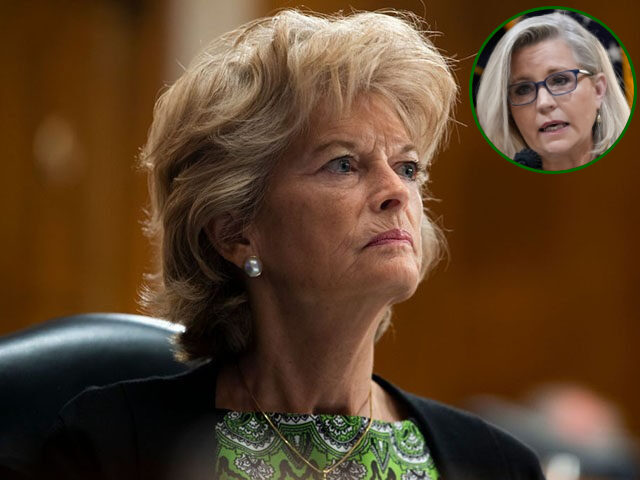Pro-impeachment and 21-year incumbent Sen. Lisa Murkowski (R-AK) has adopted departing Rep. Liz Cheney’s (R-WY) January 6 insurrection narrative heading into the November midterm election.
“That was insurrection,” Murkowski claimed on the With All Due Respect podcast with Andrew Halcro, referring to the riot. “Criminals who come in, who raided the capital on January 6, need to be tried under the due process of the law. … We need to make sure we’ve got a process that is truly fair under our Constitution, and that is what we are seeing going forward.”
“I’ve got faith in our judicial process,” she asserted.
Murkowski, tied in the polls with Trump-endorsed Kelly Tshibaka, did not mention that many January 6 rioters have been held in 23-hour-a-day isolation before their trials begin. One January 6 defendant called the maximum-security conditions “mental torture,” a condition that starkly contrasts Democrat policies of expelling criminals, including child rapists, from prison on parole.
“It’s important that on the political side, we not just move beyond this and say, you know, ‘That was just politics in Washington,'” Murkowski lectured about January 6, sounding eerily familiar to Cheney’s rhetoric.
“I’m on the Senate floor with [people] who are choosing to view what we went through as just kind of an unfortunate day that has led to some unfortunate circumstances,” Murkowski continued. “It belies the truth that we went through, that there was an intentional act of violence. … I don’t think they [Republicans] want to know the truth.”
Murkowski’s use of the “insurrection” narrative from outgoing Cheney highlights their shared uniparty, establishment dogma. Both voted to impeach former President Donald Trump. Both voted with Democrats in the last two years on key votes to help President Joe Biden’s political success. “I’m working with them to advance things,” Murkowski said on the show, vowing to assist the Biden administration if reelected:
Like Cheney, embattled Murkowski also claimed America’s justice system has been politicized by conservative Republicans, not weaponized against them. “Everything is becoming politicized,” she said.
Murkowski used the example of the FBI’s raid of former Trump’s private residence at Mar-a-Lago to blame Republicans for the politicization. “We are branding our law enforcement to the point where — are we trusting our law enforcement?” she rhetorically asked about the FBI’s raid, noting that Americans should not question the FBI’s credibility. “Are we trusting those who are there to protect our citizenry?”
Murkowski failed to acknowledge no former president has ever been raided by his political opponent in American history. Instead, she blamed many Republicans for condemning the FBI’s actions. “I’m talking about people who, before they knew a single thing, before they knew what was coming out of the Mar-a-Lago, they had made a decision about whether or not the FBI was once again on a rampage to bring somebody down or whether or not, you know, Trump brought it upon himself,” she continued.
Murkowski’s similarity to Cheney is additionally notable because, like Cheney, Murkowski’s best chance of political victory is by winning Democrat votes due to the ranked choice voting system. Democrat candidates in the open August 16 primary received about 8.5 percentage points of the vote. The way in which Alaska’s ranked choice general election and open primary system works is as follows:
All candidates from all parties appear on the ballot together in the August primary. The top four vote-getters regardless of party then advance to the general election, and their voters are given the opportunity to pick their top choice, as well as their second and third choices. If no candidate in the first round of voters’ first choices gets 50 percent of the vote, the last place candidate’s second choices are distributed across the remaining three candidates to see if someone can get across the majority threshold. If that fails again to produce a majority vote-getter, then a third round is conducted where the third place candidate’s votes are redistributed according to second choices between the remaining two candidates.
According to the two most recent polls, Tshibaka is tied with Murkowski nearly 50 days before the general election. Tshibaka leads Murkowski on the first ballot by eight points and by nine points on the second. The poll shows Tshibaka and Murkowski tied on the third ballot. Democrat Pat Chesbro received 14 percent on the first ballot and 14 percent on the second ballot before becoming ineligible for the third ballot.
It appears Tshibaka is gaining momentum. Three former U.S. Senate candidates in recent weeks have suspended their campaigns and coalesced behind Tshibaka instead of the 21-year incumbent. Because of ranked choice voting, endorsements from former candidates are exactly what Tshibaka needs to win.
Follow Wendell Husebø on Twitter @WendellHusebø. He is the author of Politics of Slave Morality.

COMMENTS
Please let us know if you're having issues with commenting.